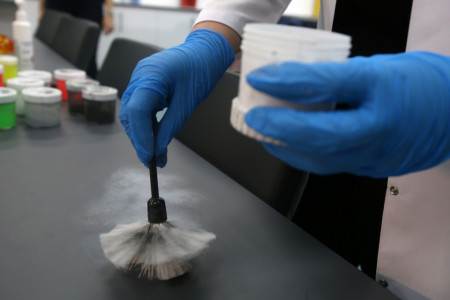
University of Bolton, Deane Road, Bolton. BL3 5AB
Tel:
Email:


“At the University of Bolton, we take great pride in providing a quality, supportive learning environment for our students.”
Professor George E Holmes DL | President & Vice Chancellor
“...tutors are very supportive and you’re not just a student ID number, at this university you are an individual with a name.”
Ellisse Vernon | BSc (Hons) Adult Nursing
Back to menu
Back to menu
Study with an Off-Campus Partner
Back to menu
Back to menu
University of Bolton, why we are the right choice
Location - Bolton, Greater Manchester

31/01/2023
Have you ever dreamed of doing what your favourite crime drama protagonist does for a living? Then a career in forensic psychology may be your true calling! The role of a crime analyst is not as glamorous as on television, it is still very exciting and rewarding. Forensic psychologists and their expertise are in demand in several areas but are most essentially needed in the criminal justice system. Now let’s understand what the term means.

What Is Forensic Psychology?
According to the American Psychological Association (APA), forensic psychology is “the application of clinical specialities to the legal arena.” It combines the practice of psychology and the law and is used to understand psychological problems associated with criminal behaviour. While they are most useful and valued in the legal system, forensic psychologists are also in demand in the private sector, school administrations, medical facilities, social work, and more.
What Do Forensic Psychologists Do?
Movie and television scriptwriters often portray forensic psychologists as “mind readers” and profilers whose only job is to track down serial killers who’ve left a string of clues and puzzles for them to solve. While it is not completely untrue, there is a lot more to forensic psychologists than just solving murder cases.
Primarily, a forensic psychologist works with law enforcement agencies to create profiles of criminals following their psychological evaluation. They conduct screenings and assessments of prisoners, investigate psychological disorders among criminals, and examine their mental health to determine if they can stand trial. Forensic psychologists are often called to testify in court on behalf of the defendants to support a theory the police or prosecutors have about their intent. Along with these functions, they may also be responsible for the following:
- Sentencing recommendations
- Expert witness testimony
- Evaluating the risk of reoffending
- Child custody evaluations
- Treatment of criminal offenders
- Academic research
- Psychological support services to inmates and offenders
Why We Need Competent Forensic Psychologists Now More Than Ever
Society and its norms are ever-changing. And an evolving society needs a reformed criminal justice system. We need competent forensic psychologists now more than ever to strengthen the criminal justice system with the latest techniques, thought processes and methods to understand and prevent modern-day crime. Forensic psychologists are vital in improving the system and can help with several important functions such as:
Understanding the Mental State of Criminals
Forensic psychologists can assess a criminal's mental condition before, at the time of, and after they've committed a crime, and suggest whether they are in their right mental state or not. They can help devise suitable punishments for criminal offences. Only well-trained and educated forensic psychologists can assess high-profile criminals and help government agencies catch, prosecute, and punish criminals.
Helping Both Victims, And Criminals
Crime is no longer black and white. There are several layers and aspects to crime and criminals. This is why it is essential to understand and help both the victims and the criminals. And that is a job for a forensic psychologist. With their knowledge, skills, and techniques, they can analyse both sides of the issue when a crime occurs and provide relevant counselling and mental health support to both parties when necessary. Forensic psychologists are also vital for helping with the rehabilitation of criminals.

Researching Criminal Behaviour
To get ahead of crime, it is crucial to think like criminals. The research and analysis conducted by forensic psychologists enable them to understand various criminal behaviour and use that analysis to profile suspects and convicted criminals. The police and law enforcement agencies can then use this information and technique to identify criminals before they can commit more crimes.
Simplifying Child Custody Battles
Gone are the days when judges and social workers presided over custody battles and decided who the child went with. As a forensic psychologist, you will be far better equipped with academic training and work experience to handle custody battles and make fair, unbiased decisions.
The University of Bolton – The Best Place to Study Criminology & Forensic Psychology
Experience #UniAsItShouldBe at the University of Bolton. Our course combines both criminology and forensic psychology and is one of our most popular courses that offer outstanding rewards and career opportunities post-completion. Successful completion of this course is approved as conferring eligibility for the Graduate Basis for Chartership (GBC) of the British Psychological Society, provided the minimum standard of qualification of second-class honours is achieved.
Our psychology courses are ranked top 10 in the UK and first in Greater Manchester for student satisfaction for the fourth year running. We have created a learning environment that offers innovative methods of teaching and assessment using top-class facilities, such as our observation and psychophysiology laboratories. We constantly update our course to reflect the themes of honour-based violence, terrorism and other topics that are relevant today.
We also strongly focus on employability skills and the practical application of your studies as well as academic success. As a result, our faculty conducts various workshops including leading group therapy and risk assessments with opportunities for placements in a relevant work setting. Most importantly, you also get to carry out a criminal justice-related work placement in your final year.
There is no better time than now to develop a successful career in forensic psychology! Find out more about the course at the University of Bolton by contacting us at enquiries@bolton.ac.uk or calling us on 01204 903807.